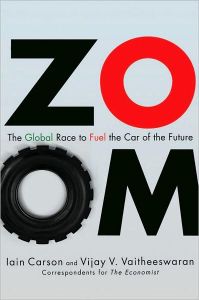Melden Sie sich bei getAbstract an, um die Zusammenfassung zu erhalten.

Melden Sie sich bei getAbstract an, um die Zusammenfassung zu erhalten.
Vijay Vaitheeswaran and Iain Carson
Zoom
The Global Race to Fuel the Car of the Future
Twelve, 2007
Was ist drin?
Fueling cars without using oil is the front line of environmental responsibility.
Recommendation
Authors Iain Carson and Vijay V. Vaitheeswaran depict “Big Oil” and “Big Auto” as the engines behind much of the world’s climate problem. Rather than condemn both, they look ahead and describe how China or the U.S., with the help of major car manufacturers, could lead the way to an oil-free future. They understand that personal transportation is too beneficial to dismiss out of hand, but that it must change. They acknowledge that the world will not run out of oil any time soon, but caution that the remaining concentrations are in the hands of countries that are unfriendly to big oil companies and the West. Moving away from foreign oil, requiring greater fuel efficiency and using biofuels look like the right first steps, they explain. The authors expect the batteries, fuel cells and even hydrogen – their particular long-term dream – to dominate in the future. They note alternatives to their vision, but express their opinions quite firmly. You may bristle if you disagree with a point or two, but getAbstract finds their overall emphasis on weaning cars from oil and driving into a prosperous postcarbon future quite interesting, along with their plea to readers to become part of grassroots movements for change.
Summary
About the Authors
Iain Carson, a former BBC anchor and reporter, has covered transportation and manufacturing for The Economist since 1994. Vijay V. Vaitheeswaran, author of Power to the People, covered the environment and energy for The Economist. He teaches at the Stern School of Business.










Comment on this summary